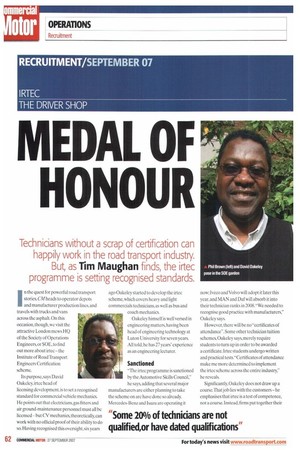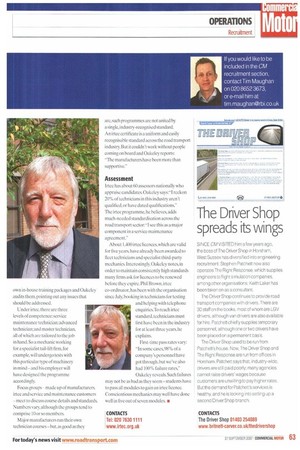MEDAL OF HONOUR
Page 62

Page 63

If you've noticed an error in this article please click here to report it so we can fix it.
Technicians without a scrap of certification can happily work in the road transport industry. But, as Tim Maughan finds, the irtec programme is setting recognised standards.
In the quest for powerful road transport stories, CM heads to operator depots and manufacturer production lines, and travels with trucks and vans across the asphalt. On this occasion, though, we visit the attractive London mews HQ of the Society of Operations Engineers, or SOE, to find out more about irtec— the Institute of RoadTransport Engineers Certification scheme.
Its purpose, says David Oakeley, irtec head of licensing development, is to set a recognised standard for commercial vehicle mechanics. He points out that electricians, gas fitters and air ground-maintenance personnel must all be licensed—but CV mechanics, theoretically, can work with no official proof of their ability to do so. Having recognised this oversight, six years ago Oakeley started to develop the irtec scheme, which covers heavy and light commercials technicians, as well as bus and coach mechanics.
Oakeley himself is well versed in engineering matters, having been head of engineering technology at Luton University for seven years. All told, he has 27 years' experience as an engineering lecturer.
Sanctioned
"The irtec programme is sanctioned by the Automotive Skills Council," he says, adding that several major manufacturers are either planning to take the scheme on are have done so already. Mercedes-Benz and lsuzu are operating it now; Iveco and Volvo will adopt it later this year, and MAN and Daf will absorb it into their technician ranks in 2008."We needed to recognise good practice with manufacturers," Oakeley says.
However, there will be no "certificates of attendance". Some other technician tuition schemes, Oakeley says, merely require students to turn up in order to be awarded a certificate. Irtec students undergo written and practical tests. "Certificates of attendance make me more determined to implement the irtec scheme across the entire industry," he reveals.
Significantly, Oakeley does not draw up a course.That job lies with the customers— he emphasises that irtec is a test of corn petence, not a course. Instead, firms put together their own in-house training packages and Oakeley audits them, pointing out any issues that should be addressed.
Under irtec, there are three levels of competence: service maintenance technician: advanced technician; and master technician, all of which are tailored to the job in hand. So a mechanic working for a specialist tail-lift firm, for example, will undergo tests with this particular type of machinery in mind — and his employer will have designed the programme accordingly.
Focus groups — made up of manufacturers, irtec and service and maintenance customers — meet to discuss course details and standards. Numbers vary, although the groups tend to comprise 10 or so members.
Major manufacturers run their own technician courses — but, as good as they are,such programmes are not united by a single, industry-recognised standard. An irtec certificate is a uniform and easily recognisable standard across the road transport industry. But it couldn't work without people coming on board and Oakeley reports: "The manufacturers have been more than supportive."
Assessment
Irtec has about 60 assessors nationally who appraise candidates. Oakeley says:"I reckon 20% of technicians in this industry aren't qualified, or have dated qualifications." The irtec programme, he believes, adds much-needed standardisation across the road transport sector:"I see this as a major component in a service maintenance agreement."
About I ,4(X) irtec licences, which are valid for five years, have already been awarded to fleet technicians and specialist third-party mechanics. Interestingly, Oakeley notes, in order to maintain consistently high standards many firms ask for licences Lobe renewed before they expire. Phil Brown. irtec co-ordinator, has been with the organisation since July, booking in technicians for testing and helping with telephone enquiries.To reach irtec standard. technicians must first have been in the industry for at least three years, he explains.
First-time pass rates vary: "In some cases, 98% of a company's personnel have got through, but we've also had 100% failure rates," Oakeley reveals. Such failures may not be as had as they seem —students have to pass all modules to gain an irtec licence. Conscientious mechanics may well have done well in five out of seven modules. • CONTACTS Tel: 020 7630 1111 www.irtec.org.uk


























































































































































































